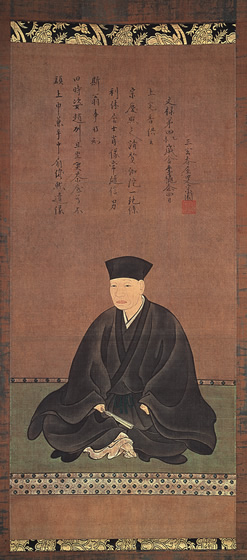 |
 |

 |


The name of the founder of the Sen family, Sen
no Rikyu (1522-91) is known not only in the
world of chanoyu, but occupies an important
place in the history of Japan. As tea master to Oda
Nobunaga (1534-82) and Toyotomi Hideyoshi (1537-98)
he established himself as the foremost tea master
in Japan, at the centre of Momoyama period
culture. Chanoyu thus holds an important
position in Japanese cultural tradition. Omotesenke,
the main family transmitting the way of chanoyu,
has preserved its traditions which have been inherited
by the present 14th generation Iemoto Jimyosai
Sosa.



Rikyu's ideal of 'wabi-cha' is not
a beauty that is directly visible to the eye but
a beauty that lies in an atmosphere and is visible
to someone seeking spiritual satisfaction. In other
words it is a beauty that is perceived by the heart
rather than the eye. Wabi-cha, based on
the ideals of Zen and waka poetry,
matured in its own way against the background of
Japan's natural features to become the basis of Omotesenke style chanoyu. |
 |
|
|
|
|
|
 |
 |
 |
 |
 |
 |

|
Copyright© 2005
Omotesenke Fushin'an Foundation. All Rights Reserved. |
 |
|